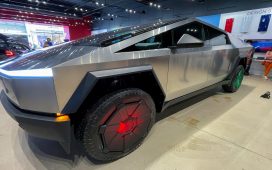DETROIT — Volvo Cars said Monday it will use a new generation of high-powered chips from Nvidia Corp. to enable more autonomous driving functions in future vehicles, starting next year.
Volvo is among a crowd of new and established automakers putting digital processing power ahead of horsepower as they try to catch up with Tesla Inc.
Tesla, the world’s most valuable automaker, has taken the lead in software-driven features and functional capability in part by equipping its cars and SUVs with powerful, and expensive, on-board computers that can manage complex tasks such as automated driving, and be upgraded over the air.
For Nvidia, the Volvo agreement, a similar deal with electric vehicle startup Faraday Future, and other agreements expected in the coming weeks mark a reboot of growth for the Santa Clara, Calif.-based gaming and data center processor company’s automotive business.
“Nvidia’s pipeline of automotive orders has grown into the many billions of dollars,” Danny Shapiro, Nvidia’s senior director of automotive, told reporters ahead of the company’s GTC21 conference Monday. Revenue for the company’s automotive business fell 23% in 2020.
Volvo Cars, owned by China’s Geely Holding, said it will use Nvidia’s new Drive Orin system, with far more processing power than current Nvidia chips used in Volvo vehicles, starting with a new generation XC90 crossover due to launch next year.
In a nod to Tesla, Volvo said vehicles equipped with the new Nvidia Orin systems will be “hardware-ready” for autonomous driving features such as a “Highway Pilot” feature that will be activated via a software download “when it is verified to be safe for individual geographic locations and conditions.”
Faraday Future said it will offer autonomous driving, parking and a “summon” feature in its FF 91 model due out in 2022. Tesla already offers a “summon” system that allows a car to navigate through a parking lot at the owner’s remote command.
Rival automakers including Daimler AG and several Chinese electric vehicle startups are taking a similar approach.
Nvidia also said Monday it is developing a new on-board computer system on a chip called Atlan that will give a car the computing power currently found in a data center. This chip should be ready for 2025 models, Nvidia said.








